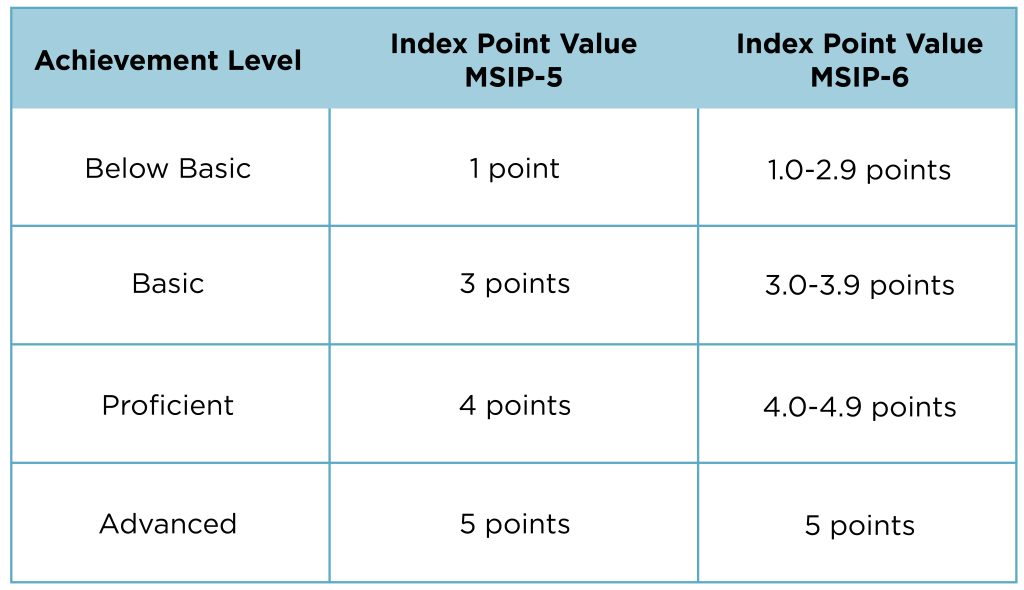MSIP-6 Is Here: What Schools Need to Know and How NEE Can Help
The Missouri Department of Elementary and Secondary Education (DESE) recently released its draft MSIP-6 Comprehensive Guide. With the release of this guide, MSIP-6 suddenly moves from something abstract happening soon to something concrete happening now. The realization that districts are accountable for the new MSIP requirements may be causing some school leaders anxiety about the planning and work MSIP is bringing.
The draft MSIP-6 Comprehensive Guide is packed with information and may have your head spinning if you have read through it. It is important to remember this is a draft guide and DESE may have other revisions before the final version is available. While planning how to address MSIP-6, districts would be wise to keep most of their plans flexible.
It is normal to have apprehension when facing changes to our practices. The Network for Educator Effectiveness (NEE) is here to help. We have reviewed the draft MSIP-6 Comprehensive Guide to determine how we can help districts in their planning process to address the requirements. More information regarding the assistance NEE will provide is shared later in this post.
MSIP-6: What We Know So Far
As expected, there are changes from MSIP-5 to MSIP-6. One of those changes is that under MSIP-5, district evaluations were based totally on performance. MSIP-6 is scored 70% on performance and 30% on continuous improvement.
Performance Measure
Over half of the performance measure is based on MAP scores for all students and the five student groups DESE has identified as having significant performance gaps (Black, Hispanic, low-income students, students with disabilities and English learners). The MAP scores component includes a status score, and progress or growth scores. In addition to the MAP score components, the performance measure also includes graduation rate, graduate follow-up, and success-ready components.
Continuous Improvement Measure
80% of the continuous improvement score (24% of the overall score) is from improvement planning, which puts a heavy emphasis on each district’s Continuous School Improvement Plan (CSIP). Also included in the continuous improvement area is a success-ready measure.
MAP Performance Index
Another significant change is that Status and Progress MAP Performance Index (MPI) scores have changed from a static number for each achievement level to a range of scores for each achievement level, referred to as a “Continuous MPI.” See the table below.
MSIP-6: What We Don’t Know Yet
DESE has labeled the MSIP-6 Comprehensive Guide as a draft for a reason. They are still working on details that will fully define some of the MSIP-6 measures.
Perhaps the biggest unknown at this time is the status targets, or cut scores, for each subject. DESE is waiting to receive the 2022 assessment data before setting these targets. They are projecting a fall 2022 release date for the status targets that will be in effect through 2025.
DESE recently released a revised draft of the MSIP-6 Comprehensive Guide. NEE is reviewing the updated guide and will report any significant changes in an upcoming blog post. You can follow along under our MSIP-6 blog category.
How NEE Can Help With MSIP-6
Just like you, we have been doing deep dives into the draft MSIP-6 Comprehensive Guide to identify what can be done now while we wait for additional information from DESE. What seems to be a clear choice for early work is planning for the development of CSIPs.
DESE has established high expectations in its scoring guides for CSIPs. Their intent is for these plans to be active documents used to bring about improvements to the district. For these plans to be effective, it is important for districts to gather all relevant data and, through a comprehensive process with all school groups, to develop a focus and clear action steps to move the district toward improvement.
This is not only what DESE is expecting for high scores on the CSIP measures; it is a practical method to make a real difference within your school district. Although it sounds simple enough, it is actually rather difficult to do without a framework for structuring this process.
NEE is developing a guide for districts to identify, monitor, and assess data points within district/school improvement plans that will serve as that framework. This guide will contain a district growth cycle, which will be helpful in establishing and maintaining a district focus; suggestions for prioritizing goals and how to use feedback at the district and school level to progress toward the goals; and much more guidance for developing an ongoing plan for improvement.
We are also developing instructions for using NEE resources to prepare the one-page responses for the Response to Standards. (See Appendix L of the draft MSIP-6 Comprehensive Guide, pages 107-111.)
Through our review of the MSIP-6 guide, we also have a good understanding of the MAP calculations. We will continue to monitor developments of MSIP-6 data requirements and will revise our information as DESE releases revisions to the MSIP-6 draft guide.
NEE’s fall Superintendent Updates for our member districts will include more detailed information about our MSIP-6 support. If you are interested in attending, registration links are provided below.
August 30th – 9 AM – To register, click on the gold button at the following link: https://neeadvantage.com/event/superintendent-update/
September 22nd – 9 AM – To register, click on the gold button at the following link: https://neeadvantage.com/event/superintendent-update-2/
Also, watch our blog for additional MSIP-6 information later this summer. We will continue to update our plans as we learn more.
Chuck Mayes is a NEE trainer and field support representative. He retired in 2020 after 30 years in K-12 public education where he served as a teacher, elementary principal, middle school principal, and for eight years as the Sikeston Chief Academic Officer/Assistant Superintendent working with curriculum, assessment, gifted education, and virtual learning.
The Network for Educator Effectiveness (NEE) is a simple yet powerful comprehensive system for educator evaluation that helps educators grow, students learn, and schools improve. Developed by preK-12 practitioners and experts at the University of Missouri, NEE brings together classroom observation, student feedback, teacher curriculum planning, and professional development as measures of effectiveness in a secure online portal designed to promote educator growth and development.




